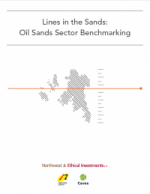This is an archive of news stories and research from the National Union of Public and General Employees. Please see our new site - https://nupge.ca - for the most current information.
"It begins with disclosure. Investors have a right to clear and comprehensive disclosure on material environmental, social and governance issues. We will be working with Northwest & Ethical to promote change using the tools of shareholder engagement." Larry Brown
 Vancouver (1 December 2009) – Oil and gas companies spending billions of dollars per year to extract petroleum from Canada’s oil sands are doing a poor job disclosing to investors on material environmental, social and governance (ESG) issues that could threaten the companies’ long-term value.
Vancouver (1 December 2009) – Oil and gas companies spending billions of dollars per year to extract petroleum from Canada’s oil sands are doing a poor job disclosing to investors on material environmental, social and governance (ESG) issues that could threaten the companies’ long-term value.
That's the conclusion of Lines in the Sands, a comprehensive new benchmarking report announced today by the Sustainable Investing team at Northwest & Ethical Investments L.P. that analyzed ESG policies and practices of 13 publicly-traded Canadian, American, and international companies with commercial oil sands operations in Northern Alberta.
The National Union of Public and General Employees (NUPGE) supported the research and is co-publisher of Lines in the Sands, along with Northwest & Ethical Investments and Ceres. Ceres is, a national network of investors, environmental organizations and other public interest groups working with companies and investors to address sustainability challenges such as global climate change.
NUPGE is committed to a joint trusteeship governance model for all its members’ pension plans. Currently, the components of NUPGE have trustees on 10 of the largest public sector pension plans in four provinces in Canada. Together, those jointly-trusteed pension plans have over C$100 billion in assets. Within the joint trusteeship model, NUPGE promotes investment strategies that recognize the importance of ESG issues in protecting the broad and long-term interests of its members.
"Almost every major oil company is either involved in developing the oil sands resource already, or plans to be," says Bob Walker, Vice President of Sustainability with Northwest & Ethical Investments L.P. "We know that oil-sands production creates a range of social and environmental impacts that companies need to address. Institutional investors can make a difference by engaging the companies they own on improving policy and practice – but to do so effectively, they need to understand how different companies are exposed in different ways to oil sands risk," said Walker.
The report examined each company’s exposure to risk on the themes of disclosure, aboriginal engagement, climate change and air pollution, water, land use and biodiversity, and corporate strategy for change.
Data-collection proved a daunting task. While a few companies stood out for the transparency of their reporting, in other cases even the most basic statistics were buried in obscure regulatory filings, amalgamated with other information, or simply not disclosed.
"It begins with disclosure. Investors have a right to clear and comprehensive disclosure on material environmental, social and governance issues," added Larry Brown, National Secretary-Treasurer of the National Union of Public and General Employees. “We will be working with Northwest & Ethical to promote change using the tools of shareholder engagement."
"Investors are concerned that many companies seem to be moving ahead without a well-articulated plan to manage the environmental and social risks associated with the oil sands," said Mindy S. Lubber, president of Ceres and director of the $8 trillion Investor Network on Climate Risk (INCR). "Given the extra-long investment horizons of oil sands projects, it is especially important for companies to invest in solutions to these challenges upfront.”
Some companies appear better placed than others to mitigate the risks. “It’s not a uniform picture. We need to encourage the leaders, and push the laggards to catch up,” said Walker, adding that Northwest & Ethical is already engaging the sector and has concluded a first round of follow-up meetings with the companies to discuss the report findings. “So far, the firms are acknowledging the need to do more to mitigate environmental, social, and governance risks. We welcome that. But given the scope and scale of the issues, more effort is needed. We will continue our engagement, and we invite global investment institutions to join us.”
NUPGE
The National Union of Public and General Employees (NUPGE) is one of Canada's largest labour organizations with over 340,000 members. Our mission is to improve the lives of working families and to build a stronger Canada by ensuring our common wealth is used for the common good. NUPGE
More information:
Lines in the Sand
